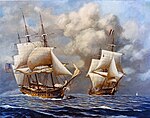Quasi-War
| Quasi War | |||||||
|---|---|---|---|---|---|---|---|
| Part of the French Revolutionary Wars | |||||||
  From top to bottom: USS Constellation vs L'Insurgente; U.S. Marines from the USS Constitution boarding and capturing French privateer Sandwich |
|||||||
|
|||||||
| Belligerents | |||||||
|
Co-belligerent:
|
|||||||
| Commanders and leaders | |||||||
|
|
|
||||||
| Strength | |||||||
| A fleet of 54 including: 18 Frigates 4 Sloops 2 Brigs 3 Schooners 5,700 Sailors and Marines 365 privateers |
Unknown fleet size Unknown number of Sailors and Marines |
||||||
| Casualties and losses | |||||||
|
American:
After U.S. military involvement:
British:
|
French:
|
||||||
American:
Before U.S. military involvement:
After U.S. military involvement:
British:
French:
The Quasi-War (French: Quasi-guerre) was an undeclared war fought almost entirely at sea between the United States of America and the French Republic from 1798 to 1800. After the toppling of the French crown during the French Revolutionary Wars, the United States refused to continue repaying its debt to France on the grounds that it had been owed to a previous regime. French outrage led to a series of attacks on American shipping, ultimately leading to retaliation from the Americans and the end of hostilities with the signing of the Convention of 1800 shortly thereafter.
The Kingdom of France, a crucial ally of the United States in the American Revolutionary War since early 1776, had loaned the US large sums of money, and had signed in 1778 a treaty of alliance with the United States of America against Great Britain. Louis XVI of France fell from power in 1792 during the French Revolution and the French monarchy was abolished. As a result, in 1794 the American government came to an agreement with the Kingdom of Great Britain, the Jay Treaty, that resolved several points of contention between the United States and Great Britain that had lingered after the end of the American Revolutionary War. It also contained economic clauses.
...
Wikipedia
